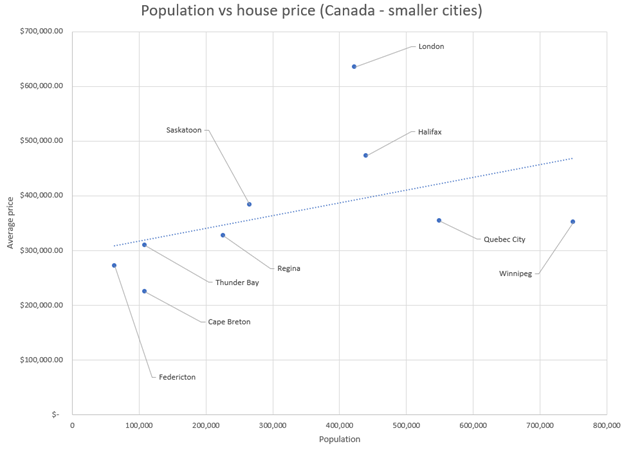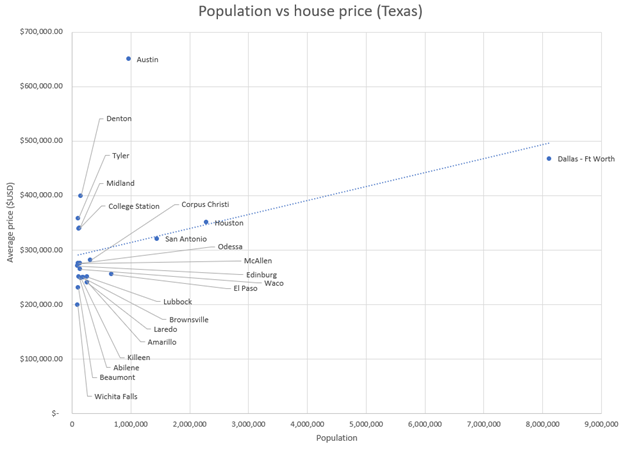Sometimes when one dives into the data, there are assumptions about anticipated findings that are completely overturned by the raw numbers. On other occasions – as is the case on this project – the data confirms the original assumptions, but provides clarification and deeper understanding.
It is unlikely to surprise anyone to learn that house prices in larger cities are typically more expensive than in smaller cities. It is widely known that your average homebuyer will pay more if they move to the big city than to a smaller market. To explore how significant the price difference is, this article examines the real estate market in two regions; Canada as a whole, and the state of Texas.
We examined the price of housing in some of the largest cities in Canada. The following chart summarizes what we found, using a mix of large and small markets. The population of a city (or metropolitan area) is shown on the horizontal axis, and the average house price is shown on the vertical axis.

Figure 1 – Population vs house price in Canada.
Not surprisingly, the general trend is toward higher prices in larger cities.
Two cities stand apart from the crowd – Vancouver and Montreal. Geography plays a central role in why house prices in greater Vancouver are comparatively high. With the Pacific Ocean to its west, the United States to the south, and mountains to the north, the Vancouver area has very limited growth options. Immigration patterns from Asia are a natural factor, with Vancouver being the westernmost city in mainland Canada.
Montreal’s departure from the trendline is likely a mix of geographic, economic, and broader national political factors too complicated to be explored in this article.
Notwithstanding these exceptions, there is a general trend toward larger cities demanding a premium on the cost of real estate. Even if we focus our attention on the smaller cities, as shown in the chart below, there is a trend toward higher prices in the more populous of the cities.

Figure 2 – Population vs house price in Canada, only looking at smaller cities.
Does this pattern hold in other jurisdictions? Crossing the border and focusing on an individual state instead of an entire nation, the following chart shows the relationship between the population of Texas cities (or metropolitan areas) on the horizontal axis, and the average house price on the vertical axis.

Figure 3 – Population vs house price in Texas.
The trend in the state of Texas roughly mimics the trend in Canada, with one notable exception; Austin. I am not a resident of Texas, nor have I spent significant time in Texas, but the city of Austin has something of a unique situation, and reputation. Two factors that are probably contributing to the high real estate prices would be that Austin is the state capital – and therefore the site of many government jobs – and is a well-known technology hub.

Furthermore, it is rumoured that a sizeable portion of those participating in an exodus from California are finding themselves drawn to Austin, and they are bringing some of the flavour of California to their new home. For better or worse, this creates a unique cultural demographic within the state – T-shirts the read “keep Austin weird” are apparently a thing – and that uniqueness may be a factor driving the real estate market. Perhaps some Californians would gladly pay a premium on real estate in Texas, as long as they get to live in California 2.0.
There is again a trend toward larger cities commanding higher prices for houses, though it seems the relationship is not as pronounced as in Canada. If we focus on the smaller cities, the trend is not as dramatic in Texas.

Figure 4 – Population vs house price in Texas, only looking at smaller cities.
Among the smaller cities, there is essentially no statistically significant correlation between population and real estate price. This suggests that factors other than population are more significant drivers for real estate prices in smaller Texas cities. For instance, Denton is the highest priced of the smaller cities included in this study, yet its population is relatively small. When one considers that Denton is just northwest of Dallas – and the average house price in Denton is only marginally lower than the average house price in Dallas – it seems plausible that Denton’s real estate market is affected by the halo effect of enjoying close proximity to such a populous metropolitan centre.
This investigation draws attention to another interesting pattern of recent decades; a trend measured in centuries instead of decades – urbanization. In what has become a global phenomenon, the percentage of the total population living in cities is increasing steadily. Of course, that means the proportion of citizens living in rural communities is dropping steadily. The following charts show the absolute numbers (not percentage) of Canadian and U.S. citizens choosing to reside in an urban setting instead of a rural community.

Figure 5 – Populations of urban and rural areas, Canada.

Figure 6 – Populations of urban and rural areas, U.S.
As the chart shows, urban centres continue to grow, whereas rural populations are stagnant.
This raises interesting questions. In a relatively free-market economy, prices are a reflection of market demand, so why the increased demand to live in larger cities? This introduces a chicken-and-egg scenario. Does the attraction of the city inspire people to relocate to it, thus growing the population, or does the larger population increase the perceived attraction of the city?
Is there an element of market “peer pressure” at play – everyone wants to live there simply because everyone wants to live there – or is it that large cities offer residents a superior lifestyle compared to smaller cities, towns, and rural areas?
Many explanations have been floated in popular culture regarding alleged advantages of larger cities. These include better access to education, employment opportunities, health care, entertainment, and culture. For certain industries, and for certain forms of entertainment and culture, the advantages of urban living are intuitively obvious. After all, major international corporations are unlikely to establish headquarters in small towns, since their operations require significant workforces. They have little choice but to settle within larger cities.
Large cities also introduce drawbacks correlated with the size of the city. Organized crime is less likely to be a problem in a town of a few hundred people than in a centre with millions of residents. Air pollution, rush hour traffic, and parking tickets are also on the list.
In a post-pandemic world within which the technology exists to support – and corporate culture appears to have accepted – work-from-home options, some speculated that we might see an increase in movement away from big centres toward less-expensive, smaller urban – even rural – areas. The data is mixed. Some sources report this is a trend, while others indicate it has already reversed. Time will tell.
While many politicians are wringing their hands over the ever-increasing cost of housing in major cities, a holistic approach to addressing the issue could include finding ways to reduce perceived barriers to entry associated with living outside of major centres. If citizens had compelling reasons to consider living in less-populous cities – or even smaller towns or out in the country – then at least part of the price problem could be alleviated.
(Paul Buller – BIG Media Ltd., 2022)


